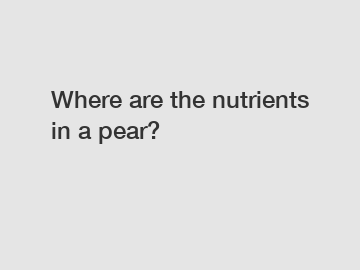Where are the nutrients in a pear?
When you think of a pear, you may just envision a sweet and juicy fruit that makes for a delicious snack. But did you know that pears are also packed with essential nutrients that are beneficial for your overall health? In this blog post, we will explore where exactly these nutrients are found in a pear and why you should consider adding this fruit to your diet.
Pears are a great source of fiber, with one medium-sized pear containing about 6 grams of this essential nutrient. Fiber is important for maintaining a healthy digestive system, as it helps to promote regular bowel movements and prevent constipation. It also plays a role in keeping you feeling full and satisfied after meals, which can aid in weight management.
In addition to fiber, pears are also rich in vitamins and minerals. One pear provides a good amount of vitamin C, which is an antioxidant that helps to protect cells from damage caused by free radicals. Vitamin C is also essential for immune function and collagen production, which is important for maintaining healthy skin, hair, and nails.

Pears are also a good source of potassium, a mineral that is important for maintaining healthy blood pressure levels. Potassium helps to regulate fluid balance in the body and supports proper muscle and nerve function. Eating pears can be a delicious way to increase your potassium intake and support your heart health.
Another important nutrient found in pears is copper, which plays a role in energy production, iron metabolism, and the formation of connective tissues. Copper is essential for maintaining the health of your bones, skin, and joints, and pears are a great way to incorporate this nutrient into your diet.
Pears also contain small amounts of other vitamins and minerals, such as vitamin K, which is important for blood clotting and bone health, and magnesium, which is necessary for muscle and nerve function. These nutrients work together to support overall health and well-being.
In addition to their nutrient content, pears are also a low-calorie and low-fat fruit, making them a healthy option for those looking to manage their weight or improve their overall diet. Pears are also naturally sweet, making them a satisfying alternative to sugary snacks or desserts.
When choosing pears, it's important to look for ones that are ripe but still firm to the touch. Pears will continue to ripen after they are picked, so you can leave them at room temperature for a few days to soften before enjoying them. Pears can be eaten on their own as a snack, added to salads for a touch of sweetness, or cooked into a variety of dishes, such as baked goods or savory dishes.
In conclusion, pears are a nutritious and delicious fruit that can help support your overall health. From their fiber content to their vitamins and minerals, pears offer a range of nutrients that are important for maintaining a healthy body. Consider adding this versatile fruit to your diet to reap the many benefits it has to offer.
The company is the world’s best Asian Yellow Pear, Crisp Chinese Yellow Pear, Yellow Asian Pear Farm supplier. We are your one-stop shop for all needs. Our staff are highly-specialized and will help you find the product you need.


